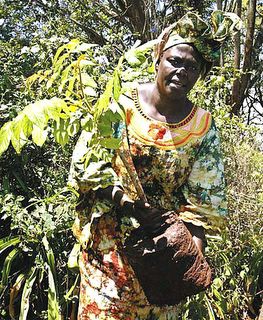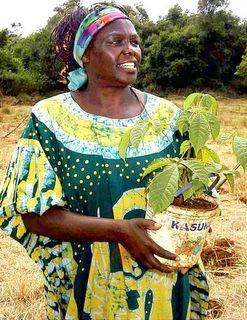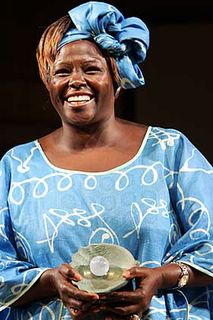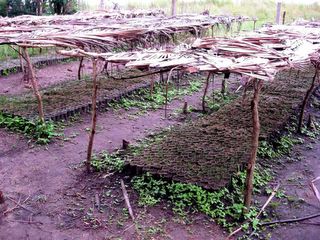
I'm glad I got to hear this morning's re-airing of Ingrid Lobet's feature on
Living on Earth called
Wangari Maathai: A Watering Can, Some Seedlings, and the Greening of a Nation. It can be heard via Real Player or MP3 and there's also a podcast of the show in case you're not awake at 6 am on a Sunday morning to catch it in its miserable time slot...
Part I: How to Persuade 100 Thousand Poor People to Plant Trees
Kenya has offered the world a new model for what an environmental movement can be, one that harnesses the power of thousands of hands. Even the hands of people with little means. In 2004 the Norwegian Nobel Committee recognized this new model and its founder, Kenyan scientist and environmentalist Wangari Maathai. Ingrid Lobet introduces us to the basic mechanics of the Green Belt tree planting movement.
Part II: It's More Than a Tree Planting Movement
As tree planters in Kenya's central highlands have reforested their region, they've seen a change in fuel availability, the food they can cook and the vegetables they can grow. And the organization they've built to plant trees gives them a way to address other problems, including government. Green Belt has been at the center of conflict to create a more democratic Kenya. But many village members, especially women, say the most important change is in their sense of self worth.
Part III: Soldier Planters, River-Keeping Children and Green Belt's Future
The Green Belt Movement continues to forge its own path, trying to bring planting to dry regions, creating revolving loans for livestock that are paid back with seedlings instead of money, and planting trees in the national forests. Now the movement faces unprecedented demand from Kenyans inspired by their Peace Prize winner. The movement entertains possible offers from the new climate change markets as it tries to find new sources of funding to meet growing demand.
This show also features great music! |
There's a bio of Maathai at
Soka Gakkai website (extracts):
 In the mid-1970's biologist Wangari Maathai became concerned about deforestation in her native Kenya. In the mid-1970's biologist Wangari Maathai became concerned about deforestation in her native Kenya.
Poverty and high population growth strain the natural environment. Poor people cut down trees for fuel and clear land to plant crops. As the trees disappear, so do the plant and animal species that depend on them.
With no ground cover to hold it, rainwater runs off and erodes the soil, depleting it of its nutrients. This degradation of the natural environment deepens the cycle of poverty. The consequences are malnutrition, water scarcity, and an increase in contagious diseases.
In 1977, working through ... the National Council of Women in Kenya, Wangari Maathai began encouraging rural women to plant trees. The initiative soon developed into a broad-based grassroots movement.
| "It's very, very important for us to take action at the local level. Because sometimes when we think of global problems, we get disempowered. But when we take action at the local level, we are empowered." |
Through this Green Belt Movement women are taught to raise and nurture tree seedlings, which they redistribute for planting where they are most needed and for which the Green Belt Movement compensates them. The income earned by the women is used to meet their immediate domestic needs such as their children's education or is invested in other income-generating ventures.
| "Every one of us can make a contribution. And quite often we are looking for the big things and forget that, wherever we are, we can make a contribution." |
The organization teaches people about the link between a healthy natural environment and healthy communities, and farmers and villagers also learn about land management practices such as composting, soil conservation and the use of indigenous crops.
Through this movement, thousands of grassroots women's groups have been created which promote sustainable development and also take up other social issues. These women have now planted more than 20 million trees throughout Kenya and established over 6,000 tree nurseries. More than half-a-million schoolchildren have been taught the values of sustainable living.
The Green Belt Movement is thus reducing the effects of deforestation while providing women with an income and empowering them to take on leadership roles within their communities.
 | "Sometimes I tell myself, I may only be planting a tree here, but just imagine what's happening if there are billions of people out there doing something. Just imagine the power of what we can do." |
What began as a small nursery in Wangari Maathai's backyard has now spread around the globe, as the methods of the Green Belt Movement have also been replicated by organizations in other countries.

|
I was so delighted by this story that I went to the
website of the Wangari Maathai Foundation and made a donation.
Technorati Tags: Environment, Ecology, Forests, Reforestation, Kenya, Africa, Desertification
 I'm glad I got to hear this morning's re-airing of Ingrid Lobet's feature on Living on Earth called Wangari Maathai: A Watering Can, Some Seedlings, and the Greening of a Nation. It can be heard via Real Player or MP3 and there's also a podcast of the show in case you're not awake at 6 am on a Sunday morning to catch it in its miserable time slot...
I'm glad I got to hear this morning's re-airing of Ingrid Lobet's feature on Living on Earth called Wangari Maathai: A Watering Can, Some Seedlings, and the Greening of a Nation. It can be heard via Real Player or MP3 and there's also a podcast of the show in case you're not awake at 6 am on a Sunday morning to catch it in its miserable time slot... 




 A few of my daughter
Melina's great posts:
A few of my daughter
Melina's great posts:








0 Comments:
Post a Comment
<< Home